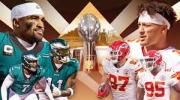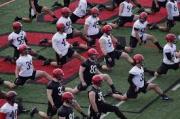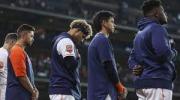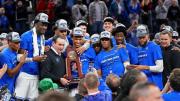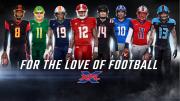Gene Therapy - NFL Draft 2022 Thoughts | Everybody's a GM

by Gene Clemons
The 2022 NFL Draft is officially in the books and, as always, it was great to watch so many young men realize their dream. They got to hear their name called and see their faces flash in front of the shield and a team logo. Then they quickly introduced to their new reality, scrutiny at every turn. Draft pundits either rifling through papers or scrolling through iPads to check their evaluations on the paper and make snap judgements on whether that young man was a good or bad selection. The players learn that fans are only fans if they believe in what you can do for their team, not because they believe in you. They get poked, prodded, and evaluated for what they did in games, only to have those performances usurped by what they do in t-shirts and shorts, then have the things they accomplished in both pushed aside because of where they played, the position the played, or the unrealized potential of another. The draft is wild, and we are here for it all. But why? Well, the answer is fairly simple, we all believe we could be the general manager of our favorite teams.
The truth is that there are so many variables that go into doing the job of a GM that drafting talent is probably not the top priority. Between managing the players that are on the team and dealing with their personal expectations, trying to fulfill the needs of the coaching staff and what they feel is necessary to put a winning product on the field the job is difficult enough. That is before you have to deal with the owner and their agenda, which could be completely different than that of the players and the coaching staff. Mix that with your own professional desires and philosophies that you believe in and the gumbo that most general managers have to mix is almost impossible for everyone to find tasty. Despite all of that, the most public job of the general manager is the draft. Even more than free agency, the draft is where GMs are asked to explain the vision without giving up any legitimate details about the plan. They have to address the issues that the fan base feels exist while also stating a purpose that they cannot fully reveal. Most people would crumble underneath so much pressure and scrutiny and still it does not stop the average fan from believing they could do a better job. We have to blame someone for these reckless assumptions, but who?
Start with Mel Kiper Jr. The oldest and most recognizable draft analyst in the game, created this space that so many others live in. He birthed a nation of draft followers and future draft analysts and writers because he is the “every man.” A guy who does not come from a legit football background who was able to turn his obsession with player evaluations and rankings into a lucrative sports career. Well, we all know that imitation is the greatest form of flattery, and with the explosion of digital media, and the easy access it provided, everybody, it was simple for others to follow Kiper's footsteps. The results are what we see today. Countless amounts of sites dedicated to the draft. Hundreds of draft guides produced and distributed, and millions of dollars pumped into draft content in order to make billions. By the way, many of us should thank Mel Kiper for his contribution to the culture. He was the north star.
You can also blame these NFL front offices. If you are given millions of dollars and a team of 50 to scout, analyze, and draft players, your hit percentage has to be higher than 50-60% or the average Joe at home watching the team every Sunday is going to believe they can do your job. After all, how can you get it wrong when you have had at least three seasons to build a file on these prospects? Why would you need a combine for anything other than medical evaluations? Why would you ever reach for unproven talent? Why would you need to project out talent when there are so many proven commodities?
Many times, people don’t understand that this is an inexact science, but it is a science. There are markers that usually point to success. Sometimes the players that a fan or a recruiting publication likes, is not even placed on the board for an NFL team. Those reasons can be as simple as a player’s medical history or as complicated as a size/athleticism ratio that the scouting department came up with those points to previous NFL success. We don’t account for the fact that sometimes the players we believe are good, an NFL team sees them as average players at best. Sometimes both sides believe a player is a quality football player, but the team does not see the player as an immediate need on the team and devalues them in the draft. Whatever the reason, these inconsistencies and unknown variables further open up the possibility for question by those who patronize a team and the NFL at large.
And once the draft is over, before a player has a chance to prove a GM right or wrong, fans and media outlets are already on to the next year. The draft and all of its tentacles have for better or worse become its own competition. Every year we award grades to the winners and losers of the draft. We give them imaginary accolades and before they have the chance to bask in their success, there is always a mock draft released pinpointing another need for the team next season. Someone equated giving a draft a grade is the equivalent of grading someone on a test before they ever take it. As ridiculous as it sounds when explained so simply, words could never be truer. That is a part of the intrigue, that is the reason why so many people feel they can do the job. Not only does it not take skill to guess, but what is the backlash when they get their choices wrong. fans never have to assume any of the responsibility when they choose a player that is a bust.
###
Gene Clemons is a Sports Analyst and Contributor to CWN Sports. His weekly column and podcast - Gene Therapy focuses on Sports, Politics and Social/Urban issues.
Read more

